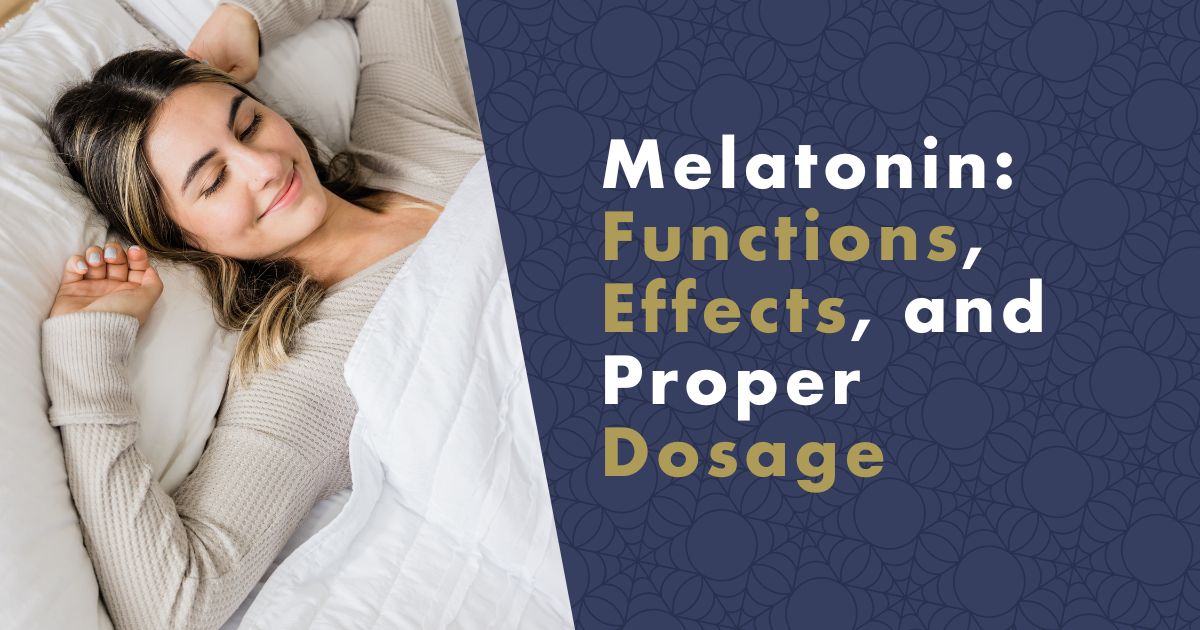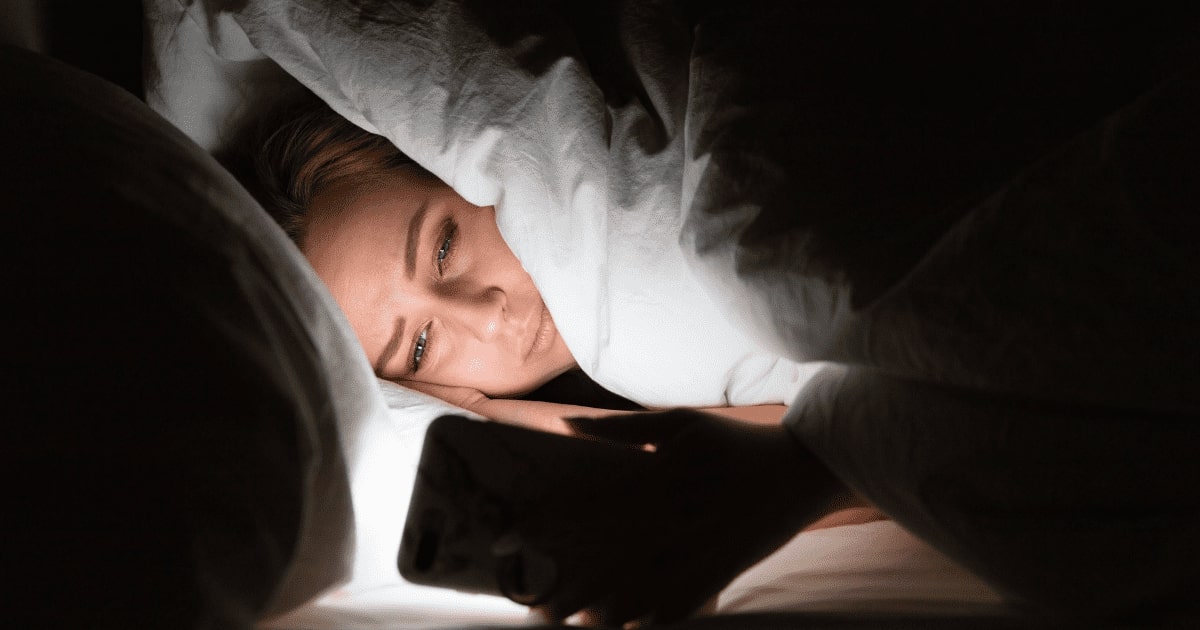Melatonin is a hormone that helps to regulate the body's sleep-wake cycle. It is produced naturally in the body, but can also be taken as a supplement to help improve sleep quality and reduce the time it takes to fall asleep. In this article, we will take a closer look at how melatonin works, its effects, and the proper dosing of this sleep hormone. We will also discuss why melatonin that is absorbed directly in the mouth is more effective than swallowing a pill.

What Is Melatonin?
Melatonin is produced by the pineal gland in the brain and is released in response to darkness. It plays a critical role in regulating the body's sleep-wake cycle, helping to signal to the body that it is time to sleep. When taken as a supplement, melatonin can help to improve sleep quality and reduce the time it takes to fall asleep.

What Is the Proper Melatonin Dosage?
The proper dosing of melatonin depends on several factors, including age, weight, and the severity of the sleep disturbance. It is generally recommended to start with a low dose and gradually increase it if needed. It is also important to take melatonin at the right time, typically 30-60 minutes before bedtime.
The Main Advantage of Taking Melatonin
Melatonin is known for its sleep-promoting effects and is used in sleep aids. In addition to its role in sleep regulation, it also has other functions, including regulating body temperature (it can decrease by up to 0.3 °C during sleep), blood pressure (it helps lower it), nervous system activity, and serving as an antioxidant (it is up to two times more effective than vitamin E). It has anti-inflammatory effects and can help with acid reflux. Some studies suggest that melatonin may have potential to reduce the side effects of chemotherapy and inhibit tumor growth, but further research is needed to confirm this.
How Effectibe is Melatnin in Tablets for Sleep?
Melatonin in the form of dietary supplements is particularly suitable for individuals with disrupted sleep cycles.

Typically, These Include:
- shift workers
- travelers (melatonin helps to better cope with jet lag)
- people with insomnia
- older people (melatonin production decreases with age)
- blind individuals (melatonin production regulation via the eye retina may be disrupted)
Melatonin tablets are available without a prescription. For example, a study from 2016 suggests the use of melatonin for sleep support. In the study, half of the 50 volunteers took 7 mg of melatonin before sleep for 14 days, while the other half took a placebo. Patients with melatonin fell asleep much better and their sleep was of better quality.
A previous study reached similar conclusions, comparing the results of 19 studies examining the effects of melatonin on sleep disorders. The study confirmed that using the sleep hormone helps people fall asleep better and extends the duration of sleep.
How to Use Melatonin to Improve Your Sleep?
Melatonin is a hormone produced by the pineal gland that helps regulate the body's sleep-wake cycle. It is often taken as a supplement to help people fall asleep and stay asleep, especially when experiencing jet lag or other disruptions to their normal sleep patterns. Some people may also take melatonin to help with anxiety, depression, or other conditions that can affect sleep. However, it is important to speak with a healthcare provider before taking melatonin to make sure it is appropriate and safe for you.

Dosage and Form of Melatonin
The recommended dose of melatonin can range from 0.5 to 10 mg. It depends on the rate and speed of melatonin tablet absorption into the body - always follow the manufacturer's recommended dosage. Typically, melatonin preparations are taken 2 to 3 hours before sleep.
Highly effective are, for example, orally soluble tablets Fast Sleep ODT, through which melatonin enters the blood in the first minute after use. It is therefore possible to take it just 30 minutes before sleep.
Thanks to its unique drug form, melatonin dissolves up to 100% faster than competing products, according to a study conducted in collaboration with the 1st Medical Faculty of Charles University. The absorption rate is up to 50% higher because most of the active substance does not pass through the liver, which breaks down melatonin.
The product also contains the aforementioned tryptophan (in the form of 5-hydroxytryptophan), from which the pineal gland produces melatonin (see above). Theanine and an extract from the magnolia officinalis are also included, which enhance the effect of melatonin and have anxiolytic effects.
What Else to Try before Using Melatonin
Before taking melatonin tablets, try adjusting your lifestyle.
The first step should be to limit the use of electronics several hours before sleep. However, this is not always possible - then comes the change in the color spectrum of the screen and the limitation of blue light emission to a minimum. This function is available in modern smartphones and laptops as standard equipment.
Excessive consumption of caffeine and alcohol contributes to poor sleep. While the first substance hinders sleep, the second suppresses the REM phase of sleep. The result is the same - inadequate recovery of the organism and excessive drowsiness the following day.

You can support the production of melatonin by better darkening the room where you sleep, or by consuming foods high in tryptophan: egg whites, dried seaweed (spirulina), cod, soy or chia seeds.
You can also try our scientifically supported tips for better sleep or a preparation with plant extracts for insomnia, which does not contain melatonin.
Side Effects of Melatonin
According to studies, short-term use of melatonin is safe even at very high doses. Side effects of melatonin preparations include dizziness, nausea and headaches.
Melatonin is not recommended for pregnant and lactating women. People taking antidepressants or blood thinners and blood pressure medication should also avoid it, as melatonin may interact with these preparations. We recommend consulting a doctor before taking melatonin.
What to Take Away from the Article?
- The main function of melatonin, produced by the pineal gland, is the regulation of sleep and circadian rhythms. The more melatonin is released into the blood, the sleepier and more susceptible to sleep a person is.
- According to a number of studies, melatonin also positively affects blood pressure, has the potential to suppress heartburn and has anti-inflammatory effects. It is also a great antioxidant.
- During daily and artificial lighting, the production of melatonin in the pituitary gland decreases and the person is more alert. In the dark, on the other hand, melatonin synthesis increases, so drowsiness increases with twilight.
- Sleep disorders increase the risk of cardiovascular disease, obesity, type 2 diabetes and other diseases.
- Melatonin preparations are suitable for you if you work shifts, suffer from insomnia or need to get rid of jet lag when traveling.
- The recommended daily dose of melatonin tablets is 1 tablet (1 mg of melatonin). The effect of the sleep hormone is further supported by 5-hydroxytryptophan, theanine and an extract from the magnolia officinalis.
- You can support natural melatonin production by limiting the use of electronics before bedtime, avoiding caffeine and alcohol, darkening the bedroom and consuming foods high in tryptophan.
- Melatonin is not recommended for pregnant and lactating women, people taking antidepressants or blood thinners and blood pressure medication, and for children under the age of 3. It is important to consult a doctor before taking melatonin.
Sources
-
Bliwise, D. L. (1993). Sleep in normal aging and dementia. Sleep, 16(1), 40-81.
-
National Sleep Foundation. (2013). Sleep in America® Poll: Sleep and Aging.
-
Ohayon, M. M. (2002). Epidemiology of insomnia: what we know and what we still need to learn. Sleep medicine reviews, 6(2), 97-111.
-
Buysse, D. J., Reynolds III, C. F., Monk, T. H., Berman, S. R., & Kupfer, D. J. (1989). The Pittsburgh sleep quality index: A new instrument for psychiatric practice and research. Psychiatry Research, 28(2), 193-213.
-
Krueger, J. M., & Obál Jr, F. (1993). Sleep function. Frontiers in bioscience: a journal and virtual library, 1, d233-d243.
-
Wong, M. L., Lau, E. Y., Wan, J. H., & Cheung, S. F. (2013). The interplay between sleep and mood in predicting academic functioning, physical health and psychological health: A longitudinal study. Journal of psychosomatic research, 74(4), 271-277.
-
Buysse, D. J., Reynolds III, C. F., Monk, T. H., Berman, S. R., & Kupfer, D. J. (1989). The Pittsburgh sleep quality index: A new instrument for psychiatric practice and research. Psychiatry Research, 28(2), 193-213.
-
Maraldi, C., Volpato, S., Penninx, B. W., Yaffe, K., Simonsick, E. M., Strotmeyer, E. S., ... & Ferrucci, L. (2015). Impact of inflammation on the relationship among sleep duration, cognitive impairment, and dementia: A multicenter cohort study. Journal of the American Geriatrics Society, 63(2), 227-234.
-
Cajochen, C., & Chellappa, S. L. (2016). The effects of sleep hygiene education on sleep hygiene behaviors in children with neurodevelopmental disabilities. Journal of clinical sleep medicine: JCSM: official publication of the American Academy of Sleep Medicine, 12(3), 447-449.
-
Afonso, P., Figueiredo-Braga, M., Tavares, J., & Paiva, T. (2018). Sleep hygiene and actigraphic evaluation of insomnia in a sample of Portuguese college students. Sleep and Breathing, 22(3), 643-650.
- Walker, M. (2017). Why we sleep: Unlocking the power of sleep and dreams. Simon & Schuster.
- LEGER, Damien, et al. Poor sleep is highly associated with house dust mite allergic rhinitis in adults and children. Allergy, Asthma & Clinical Immunology, 2017, 13: 1-9.
-
Dement, W. C., & Vaughan, C. (1999). The promise of sleep: A pioneer in sleep medicine explores the vital connection between health, happiness, and a good night’s sleep. Delacorte Press.
-
Carskadon, M. A., & Dement, W. C. (2011). Normal human sleep: An overview. In Principles and practice of sleep medicine (5th ed., pp. 16-26). Elsevier Saunders.
-
Horne, J. (2013). Why we sleep: The functions of sleep in humans and other mammals. Oxford University Press.
-
Siegel, J. M. (2004). The essential neuroscience of sleep. MIT Press.

